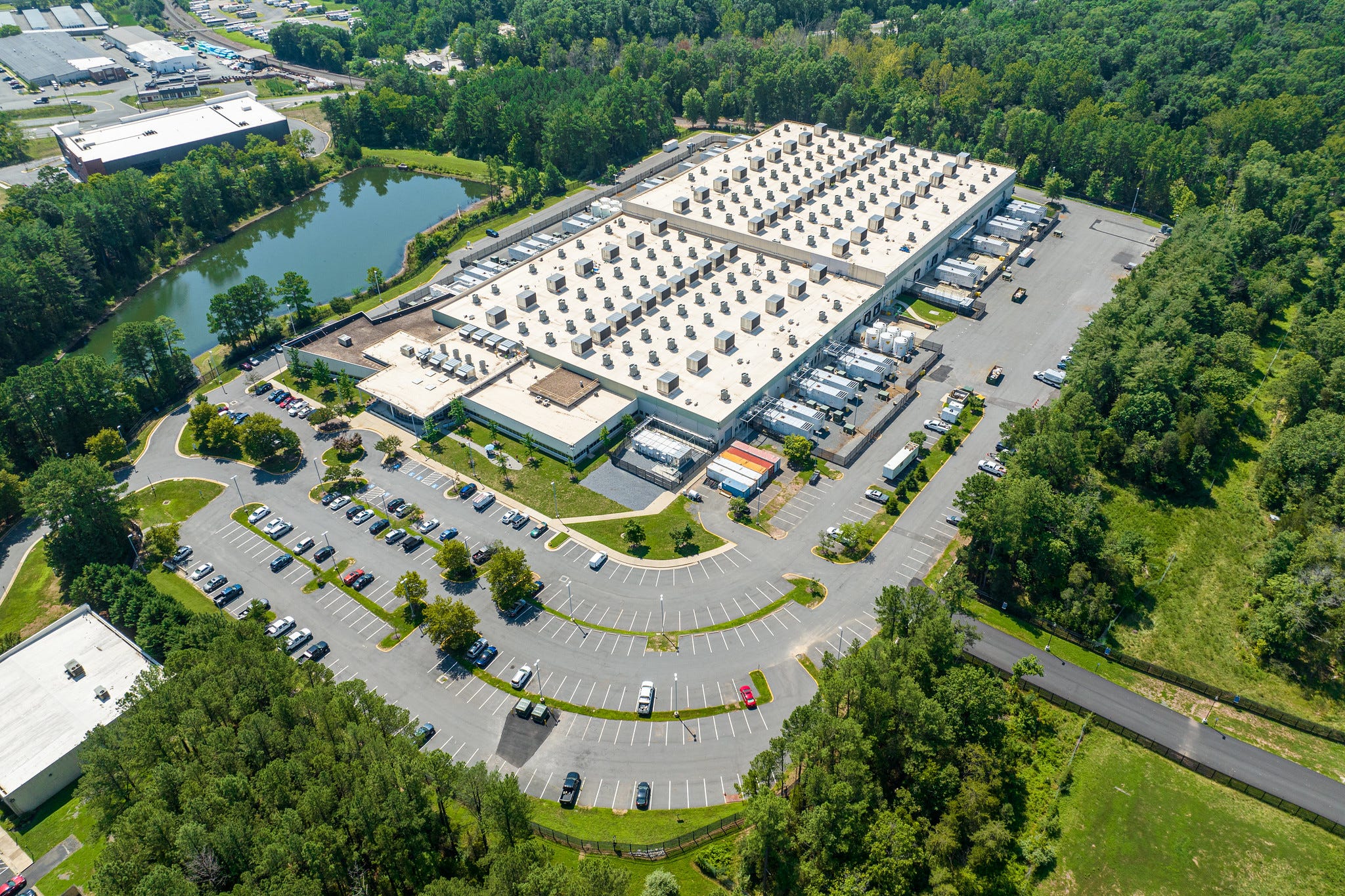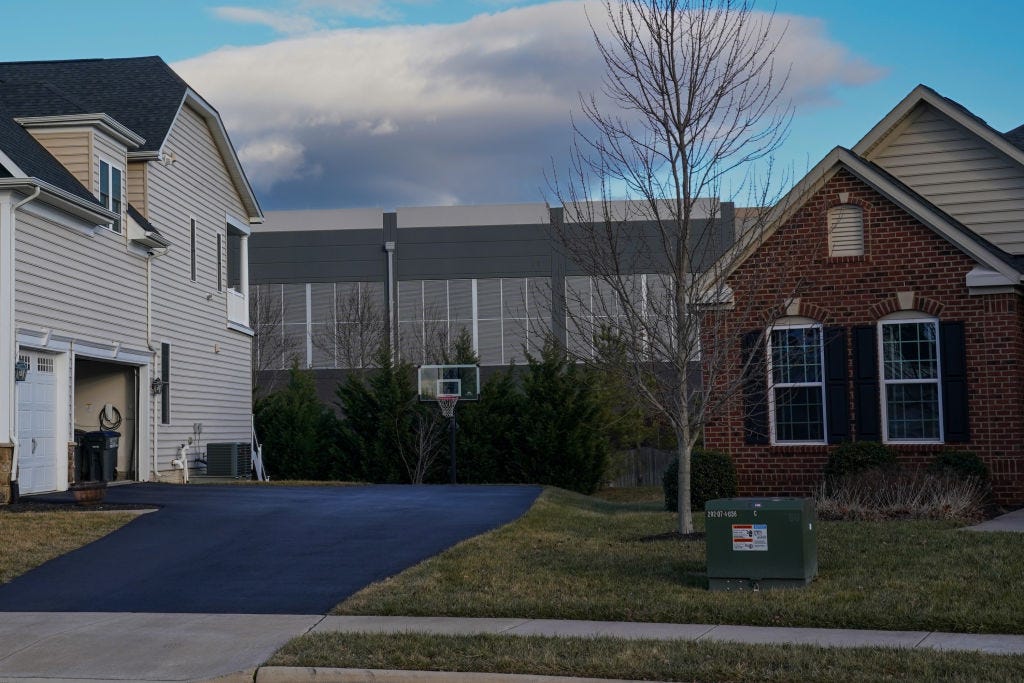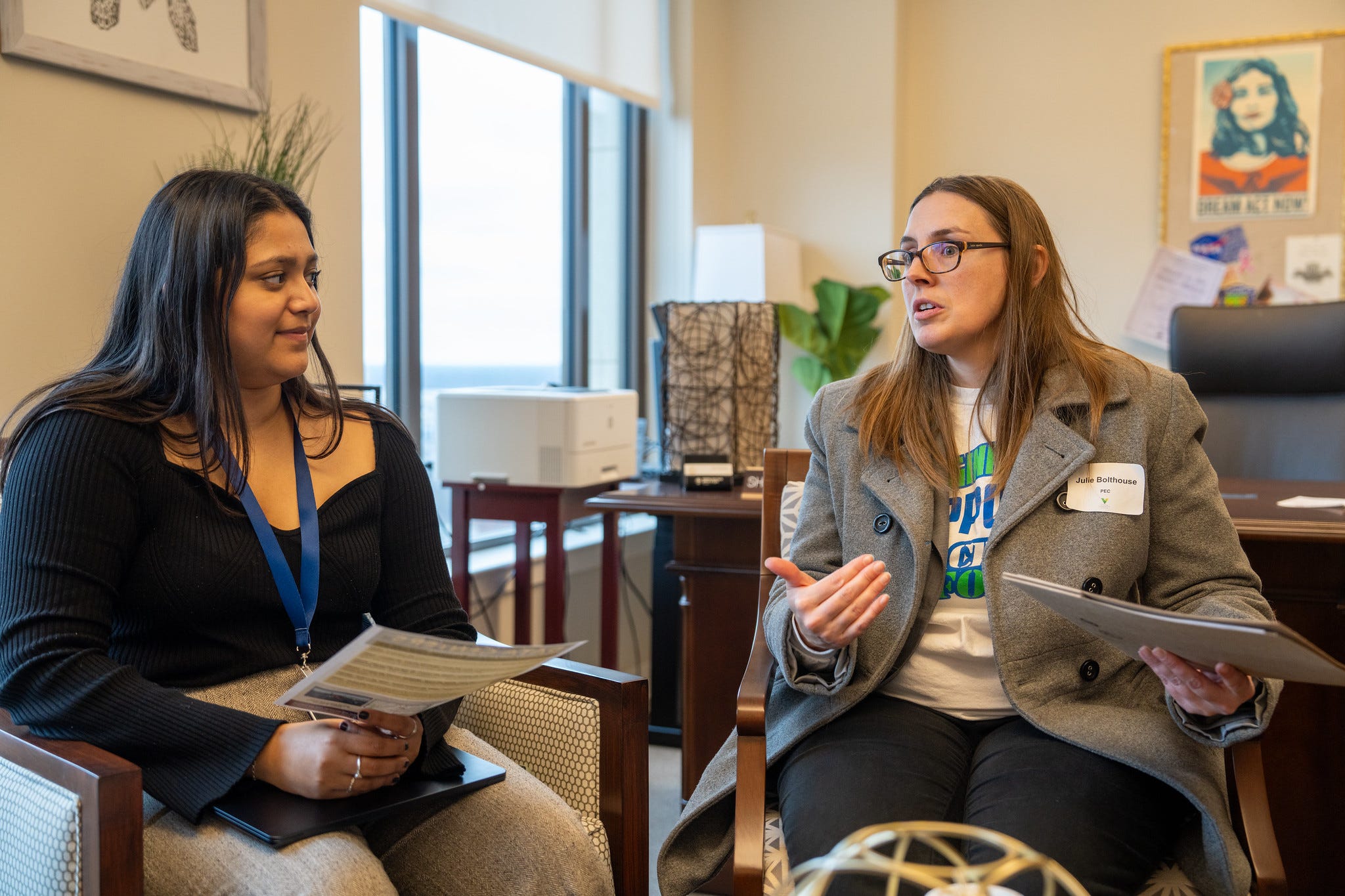How grassroots climate activists are taking on Big Tech
Welcome back to HEATED—Arielle here. Today’s article dives into how the tech industry is transforming Northern Virginia, where I grew up biking on trails now in the shadow of hundreds of data centers. It’s a story that’s close to my heart, as I rarely get to report on my hometown. The story also focuses on how regular Virginians are banding together to push for accountability. It’s part of our mission to tell more climate stories that illustrate the nitty-gritty of how policy change occurs. There’s clear demand for more stories like these. We recently surpassed 100,000 free subscribers, making us the most-read climate newsletter on Substack. To support this growth, though, we need more people to step up and join the much smaller community that funds the newsletter. So if you appreciate our coverage and have the means, would you consider becoming a paid supporter? Either way, thank you for being part of our reader community! We hope you enjoy the piece. How grassroots climate activists are taking on Big TechIn Virginia, a small conservation group is leading the fight against the powerful and secretive data center industry.A growing climate threat from an industry worth trillions is spreading across the globe: data centers. The football-field-size buildings, which house the millions of servers that make the internet work, are not inherently evil. But their unchecked expansion—driven primarily by artificial intelligence and cryptocurrency—is driving a resurgence in coal power and derailing states’ clean energy transition plans. The IEA estimates that in the next two years, data centers could consume as much energy as the United Kingdom and Germany combined, with a carbon footprint on par with the aviation industry. And right now, there are few concerted activist movements dedicated to holding the tech industry accountable for these buildings’ massive climate impact. But in Virginia, the world’s data center capital, one local group is starting to move the needle. The case of the 4,000 diesel generatorsThe Piedmont Environmental Council is a 50-year-old conservation group, one that’s traditionally focused on protecting the forests and rivers of the Virginia Piedmont. But in the last three years, its leaders decided to change course, and make taking on Big Data one of its primary focuses. The switch has made PEC one of the only concerted activist movements in the world dedicated to holding the data center industry accountable. PEC had good reason to make the switch. Virginia is home to the world’s largest number of data centers, more than 300 in all, which process an estimated 70 percent of the world’s internet traffic. Within the next five years, those data centers will cover more than 26,500 acres, an area almost twice the size of Manhattan, and require the equivalent of more than four nuclear power plants worth of power, according to the Sierra Club. I was able to see the expansion for myself after Julie Bolthouse, PEC’s director of land use, offered to give me a tour of an especially populated area nicknamed “Data Center Alley.” One of our first stops was an old railroad-turned-popular-walking-path, which is now surrounded by hundreds of diesel generators the size of train cars, meant as backup power for data centers. If turned on, the generators have the potential to emit a multitude of hazardous pollutants into nearby communities that could cause health problems from childhood asthma to lung cancer. PEC is the only reason anyone knows these diesel generators exist. In 2023, staff member John McCarthy just happened to be looking through regulatory town hall announcements, and saw a proposal to waive air pollution requirements for a mystery project in Loudoun County. Bolthouse contacted the Virginia Department of Environmental Quality (DEQ) to find out what the project was. But the DEQ wouldn’t share the information, she said. So PEC filed a public records request, and the state Commonwealth Attorney’s Office ordered the DEQ to reveal the proposed project: 4,021 diesel fuel generators for data centers. “We were alarmed to find out that we have that much diesel power piled up,” said Bolthouse. The amount was 11 gigawatts–enough to power over 900 homes for a year. The resistance from state officials to disclose the pollution waivers "was very unusual because these are public permits,” Bolthouse told me. “I was so pissed off by their behavior, I stayed up all night for like two nights straight,” working on a map of the generators’ potential polluting impact. PEC then shared that information with the media, encouraged residents to show up at public hearings, and organized a rally outside the DEQ. The public pressure worked—DEQ walked back the waiver. The DEQ did not immediately respond to my request for comment. That was PEC’s first victory in what is turning out to be a years-long fight for transparency and regulation of the most lucrative industry in the state. In Virginia, many data center projects are being developed in secret, as county officials sign nondisclosure agreements with tech companies that hide everything from company names, building plans, energy needs, and any other information the tech industry deems “proprietary.” So PEC has tried to shed light. So far, the group has mapped over 330 existing and proposed data centers in the state. The proposed data centers alone will cover 180 million square feet, or the equivalent of 1,000 Walmart Super Centers. Soon, PEC was receiving calls from people all over the state asking for help with the data centers in their neighborhoods. They brought together nearly 40 organizations, from homeowner associations to the Sierra Club, to form the Virginia Data Center Reform Coalition. “We're all rallied around basically one sound bite, one purpose, which I think is a huge win,” said Bolthouse. "We were all individually playing whack-a-mole with these projects, and we were all losing.” “The biggest climate issue we’re facing right now”The quietly growing climate threat from data centers isn’t just from a few thousand diesel backup generators in one state—it’s from the enormous amount of electricity needed to power them. According to the Department of Energy, one data center can require 50 times the electricity of a typical office building. Because of this, utility company Dominion now estimates that data centers alone will double electricity demand in the state by 2040. The surge is endangering Virginia’s goal of reaching net zero emissions by 2050, as alternatives like solar and wind aren’t growing fast enough to meet demand. Instead, Dominion has decided not only to build new methane gas plants, but to continue running old coal plants that had been scheduled to retire—meaning residents living near those plants will have to continue living with toxic pollution. Environmental justice advocates and state lawmakers are concerned that the proposed new plants are being built near communities that are disproportionately low-income and communities of color. “This is the biggest climate issue we're facing right now,” said Tim Cywinski, communications director for the Virginia Sierra Club. “The preservation and the increase in fossil fuels is directly tied to data center growth, unfortunately.” Data centers also require vast amounts of water for electricity and cooling. Bolthouse discovered that Loudoun County’s water use has increased 250 percent due to data centers, a surge that has environmentalists worried about the state’s drinkable water supply. While Virginia isn’t as drought-stricken as Arizona, California, or Oregon, where data centers are using up to a quarter of a city’s water supply, last year the state also experienced a record-breaking drought. These issues are only expected to grow alongside the data center industry. In 2021, data center expansion dominated Virginia’s economy, attracting 62 percent of the state’s new investments. Amazon alone has spent $52 billion building data centers in the state, and is planning to spend an additional $35 billion by 2040. That sum represents the “largest economic investment in Virginia history,” said Governor Glenn Youngkin in a tweet. It’s a big reason why Bolthouse says Virginia lawmakers have been reluctant to fight it. “To them, this is the golden goose,” said Bolthouse. “That's what runs our schools. That's what runs our government. That's what runs everything in the county.” Power in numbersThe majority of PEC’s activism around data centers hasn’t been about stopping them, per se. It’s been about slowing them down, to ensure taxpayers and lawmakers have all the information about their environmental impact before moving forward. When PEC first started working on data centers, they found that county officials weren’t asking about the electricity or water demands of proposed projects, much less their impact on pollution. “They're out there approving all these data center projects without any kind of oversight,” said Bolthouse. Earlier this year, PEC and the Data Center Reform Coalition met with state officials in Richmond, “connecting some of these dots between the clean energy transition and carbon emissions and generative AI,” said PEC’s climate director Ashish Kapoor. Lawmakers on both sides of the aisle shared the coalition’s concerns. This past legislative session, both Republican and Democratic representatives proposed bills seeking to regulate the industry’s impact. “I understand the need for data centers; I'm a tech guy myself,” said Democratic Senator Suhas Subramanyam, who proposed several bills regulating data centers’ environmental impact and use of fossil fuels. “But just like any other industry, we can build responsibly and in a way that's good for our environment and good for the community.” None of these proposed bills passed this year. But for the first time, the state pushed for an independent study of data centers’ impact. The study authors even reached out to PEC for their data. There are other ways that PEC’s work is paying off. Last month, the Loudoun County Board of Supervisors voted 5-4 to stop a new data center from more than doubling its size to 2.9 million square feet. The Chair of the Loudoun County Board of Supervisors did not respond to my request for comment. In some ways, "It’s not a huge win,” said Bolthouse, because it didn’t stop the data center from being built. But on the other hand, for the first time county supervisors thought about the energy impacts of the data center before they approved it. “They finally were asking the right questions,” Bolthouse said. “They were asking, but where is the energy going to come from, and how many substations will be required?” Getting local politicians to ask the right questions can feel like a small victory when faced with Big Tech’s appetite for expansion. For Bolthouse, it can be frustrating. “I definitely don't feel like I'm winning,” she said. But organizing and educating people are the only way sweeping changes are made–and Tim Cywinski of the local Sierra Club chapter credits PEC for doing just that. How are you contributing to the climate fight? How can people help?HEATED’s comments are usually limited to paid subscribers. Today, we’re opening them up to the public, in the hopes of helping interested readers find an activism route that feels right for them. If you’re an organizer, feel free to comment with information about the campaign you’re working on, and how people can help. Or if you’ve found a creative/unexpected way to contribute, please share that with the class as well. Further reading:
Catch of the day: Reader Adrienne says Rani, whose name means “queen” in Hindi, sure does rule their lives. But she’s a benevolent ruler, because the cuddly 6-year-old black Lab from Boston rides public transit, eats a vegetarian diet, and becomes best friends with any one who pets her. Want to see your furry (or non-furry!) friend in HEATED? It might take a little while, but we WILL get to yours eventually! Just send a picture and some words to catchoftheday@heated.world. You're currently a free subscriber to HEATED. For the full experience, upgrade your subscription. |
Older messages
If Trump can be convicted, so can Big Oil
Tuesday, June 11, 2024
Progressive prosecutors should be taking a more aggressive stance against fossil fuel companies, advocates argue. ͏ ͏ ͏ ͏ ͏ ͏ ͏ ͏ ͏ ͏ ͏ ͏ ͏ ͏ ͏ ͏ ͏ ͏ ͏ ͏ ͏ ͏ ͏ ͏ ͏ ͏ ͏ ͏ ͏ ͏ ͏ ͏ ͏ ͏ ͏ ͏ ͏ ͏ ͏ ͏ ͏ ͏ ͏ ͏
U.N. chief calls for global fossil fuel ad ban
Wednesday, June 5, 2024
The New York Times, one of the biggest purveyors of fossil fuel ads, did not respond to our request for comment. ͏ ͏ ͏ ͏ ͏ ͏ ͏ ͏ ͏ ͏ ͏ ͏ ͏ ͏ ͏ ͏ ͏ ͏ ͏ ͏ ͏ ͏ ͏ ͏ ͏ ͏ ͏ ͏ ͏ ͏ ͏ ͏ ͏ ͏ ͏ ͏ ͏ ͏ ͏ ͏ ͏ ͏ ͏ ͏
What is a “leftist climate scientist” president, exactly?
Tuesday, June 4, 2024
Mexico's first female president is not a Green New Deal-supporting radical—not by a long shot. ͏ ͏ ͏ ͏ ͏ ͏ ͏ ͏ ͏ ͏ ͏ ͏ ͏ ͏ ͏ ͏ ͏ ͏ ͏ ͏ ͏ ͏ ͏ ͏ ͏ ͏ ͏ ͏ ͏ ͏ ͏ ͏ ͏ ͏ ͏ ͏ ͏ ͏ ͏ ͏ ͏ ͏ ͏ ͏ ͏ ͏ ͏ ͏ ͏ ͏ ͏
Are your internet habits killing the planet?
Monday, June 3, 2024
The internet is quickly becoming a major contributor to climate change. Here's how to understand the problem—and what can be done to fix it. ͏ ͏ ͏ ͏ ͏ ͏ ͏ ͏ ͏ ͏ ͏ ͏ ͏ ͏ ͏ ͏ ͏ ͏ ͏ ͏ ͏ ͏ ͏ ͏ ͏ ͏ ͏ ͏
Democrats ask DOJ to investigate Big Oil
Wednesday, May 22, 2024
Here's what to know, and why it's important. ͏ ͏ ͏ ͏ ͏ ͏ ͏ ͏ ͏ ͏ ͏ ͏ ͏ ͏ ͏ ͏ ͏ ͏ ͏ ͏ ͏ ͏ ͏ ͏ ͏ ͏ ͏ ͏ ͏ ͏ ͏ ͏ ͏ ͏ ͏ ͏ ͏ ͏ ͏ ͏ ͏ ͏ ͏ ͏ ͏ ͏ ͏ ͏ ͏ ͏ ͏ ͏ ͏ ͏ ͏ ͏ ͏ ͏ ͏ ͏ ͏ ͏ ͏ ͏ ͏ ͏ ͏ ͏ ͏ ͏ ͏ ͏ ͏ ͏
You Might Also Like
7 Home Upgrades That Require Zero Tools
Friday, February 28, 2025
Skype Is Dead. There are plenty of ways to make quick improvements to your house without a single hammer or screwdriver. Not displaying correctly? View this newsletter online. TODAY'S FEATURED
Heidi Klum Matched Her Red Thong To Her Shoes Like A Total Pro
Friday, February 28, 2025
Plus, the benefits of "brain flossing," your daily horoscope, and more. Feb. 28, 2025 Bustle Daily Here's every zodiac sign's horoscope for March 2025. ASTROLOGY Here's Your March
How Trans Teens Are Dealing With Trump 2.0, in Their Words
Friday, February 28, 2025
Today in style, self, culture, and power. The Cut February 28, 2025 POWER How Trans Teens Are Dealing With Trump 2.0, in Their Words “Being called your correct name and pronouns can be the difference
The Eater Oscars for best bites in film this year
Friday, February 28, 2025
An NYC cafe garners celebrity support after rent hike
The Must-See Movies The Oscars Overlooked
Friday, February 28, 2025
Plus: Celebrities pay tribute to Michelle Trachtenberg. • Feb. 28, 2025 Up Next Your complete guide to industry-shaping entertainment news, exclusive interviews with A-list celebs, and what you should
The Best Cropped Jackets for Spring, Styled by Us
Friday, February 28, 2025
Plus: What we carried in our bags at Fashion Week. The Cut Shop February 28, 2025 Every product is independently selected by our editors. Things you buy through our links may earn us a commission.
The chicken and the eggs
Friday, February 28, 2025
and where they both come from ͏ ͏ ͏ ͏ ͏ ͏ ͏ ͏ ͏ ͏ ͏ ͏ ͏ ͏ ͏ ͏ ͏ ͏ ͏ ͏ ͏ ͏ ͏ ͏ ͏ ͏ ͏ ͏ ͏ ͏ ͏ ͏ ͏ ͏ ͏ ͏ ͏ ͏ ͏ ͏ ͏ ͏ ͏ ͏ ͏ ͏ ͏ ͏ ͏ ͏ ͏ ͏ ͏ ͏ ͏ ͏ ͏ ͏ ͏ ͏ ͏ ͏ ͏ ͏ ͏ ͏ ͏ ͏ ͏ ͏ ͏ ͏ ͏ ͏ ͏ ͏ ͏ ͏ ͏ ͏ ͏ ͏ ͏ ͏ ͏ ͏
March's Guest Editor: Kim Addonizio
Friday, February 28, 2025
Thank you for supporting Poem-a-Day ͏ ͏ ͏ ͏ ͏ ͏ ͏ ͏ ͏ ͏ ͏ ͏ ͏ ͏ ͏ ͏ ͏ ͏ ͏ ͏ ͏ ͏ ͏ ͏ ͏ ͏ ͏ ͏ ͏ ͏ ͏ ͏ ͏ ͏ ͏ ͏ ͏ ͏ ͏ ͏ ͏ ͏
New and Old #203
Friday, February 28, 2025
Friday roundup and commentary ͏ ͏ ͏ ͏ ͏ ͏ ͏ ͏ ͏ ͏ ͏ ͏ ͏ ͏ ͏ ͏ ͏ ͏ ͏ ͏ ͏ ͏ ͏ ͏ ͏ ͏ ͏ ͏ ͏ ͏ ͏ ͏ ͏ ͏ ͏ ͏ ͏ ͏ ͏ ͏ ͏ ͏ ͏ ͏ ͏ ͏ ͏ ͏ ͏ ͏ ͏ ͏ ͏ ͏ ͏ ͏ ͏ ͏ ͏ ͏ ͏ ͏ ͏ ͏ ͏ ͏ ͏ ͏ ͏ ͏ ͏ ͏ ͏ ͏ ͏ ͏ ͏ ͏ ͏ ͏ ͏ ͏ ͏ ͏ ͏ ͏
Living seasonally
Friday, February 28, 2025
10 things worth sharing this week ͏ ͏ ͏ ͏ ͏ ͏ ͏ ͏ ͏ ͏ ͏ ͏ ͏ ͏ ͏ ͏ ͏ ͏ ͏ ͏ ͏ ͏ ͏ ͏ ͏ ͏ ͏ ͏ ͏ ͏ ͏ ͏ ͏ ͏ ͏ ͏ ͏ ͏ ͏ ͏ ͏ ͏ ͏ ͏ ͏ ͏ ͏ ͏ ͏ ͏ ͏ ͏ ͏ ͏ ͏ ͏ ͏ ͏ ͏ ͏ ͏ ͏ ͏ ͏ ͏ ͏ ͏ ͏ ͏ ͏ ͏ ͏ ͏ ͏ ͏ ͏ ͏ ͏ ͏ ͏ ͏ ͏ ͏ ͏




